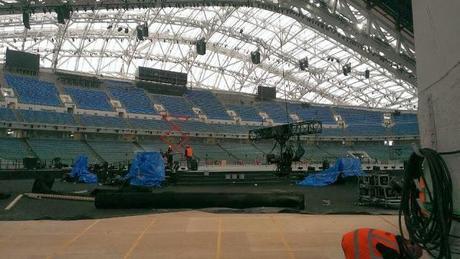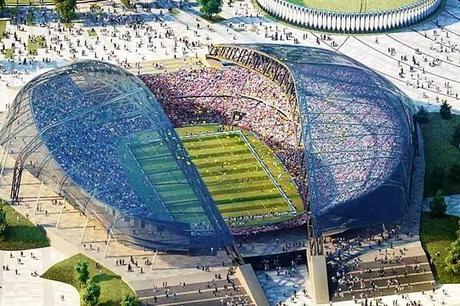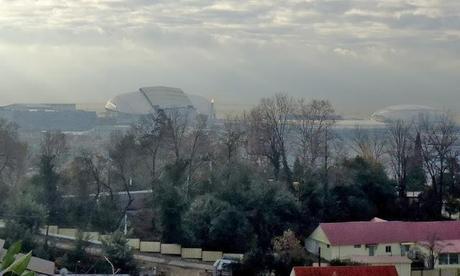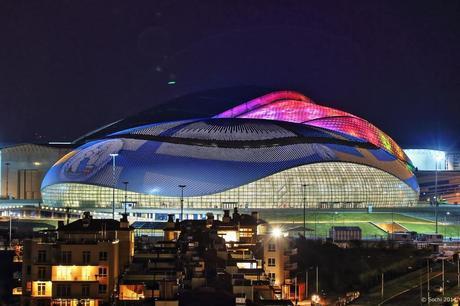
Stadium Floor - this morning!
It is my penultimate day in America - I will spend it at a Vietnamese restaurant and perhaps with La Boheme at the Met, Zeffirelli production of course.Tomorrow I leave for Russia!
Last night I watched several ceremony productions from past years, and productions not a part of the Olympic Games. I cannot tell you how excited I am for this production - it will be one of the largest artistic events in history.
Over the next few weeks, I will give you a brief history of the organizing of these ceremonies.

Original Stadium Concept for the Sochi 2014 Games
The picture above is of the original concept for the Olympic Stadium. A lot has changed since this original idea. Obviously, this is a soccer stadium, but the Olympic Stadium has now turned into a world-class cultural center. It will in fact host some world cup soccer events in the future, but instead of becoming the home to a soccer team, it will essentially become the world's largest performing arts venue. An opera company has already been in talks to produce several operas a year in massive fashion.So, how did this come about - from a sports stadium to enormous performing arts venue?
The ceremonies team found that with the open-air stadium, the wind would be too challenging in order to create some of the elements of the ceremonies. The stadium is along the coast, sub-tropical coast, which is adjacent to the tallest mountain in Europe, a frigid-dead ice mountain. The temperature and elevation differences make enormous winds throughout the Sochi region, 60 mph at times. It would be too dangerous for some of the ceremonial operations, so the ceremonies team decided to fill in the center section with a dome of twelve large tracks. These tracks can carry suspended props many tons in weight across the stadium, from several colossal backstage barns.

Stadium enclosed

Domed Olympic Stadium in Sochi
Now with the stadium closed, there are some amazing dramatic opportunities for the ceremonies. I will try to explain what I can without giving anything away. One of the most dramatic parts of the performance space was taken in part from the ideas presented in the 2008 Beijing Opening Ceremony and the 2012 London Opening Ceremony. The former had a film across the top of the stadium to project images upon, and the latter had bright LED screens attached to every seat in order to paint images across the stadium seats. Prior to 2012, those who attended many of the opening ceremonies of recent were given white rain coats and acted as a canvas for rather poorly projected images illuminated onto the stadium crowd. And preceding that, they did the rather painstakingly archaic, "hold up a colored card" method of using the physical stadium as a canvas.The stadium here in Sochi will use powerful projectors and use the roof as a canvas to project images upon The roof itself contains lights within the covering mesh allowing for even more vivid visual results. Essentially, it is the difference between going to an IMAX movie on a flat giant screen and an IMAX movie in a domed theater where the projection completely surrounds you. Without giving anything away, you can see the result outside of the stadium with the time-lapse video below during one of the very first tests a couple of months ago of the lights placed within the roof covering. It will look fantastic from inside the stadium.

Tomorrow I leave for Russia!

